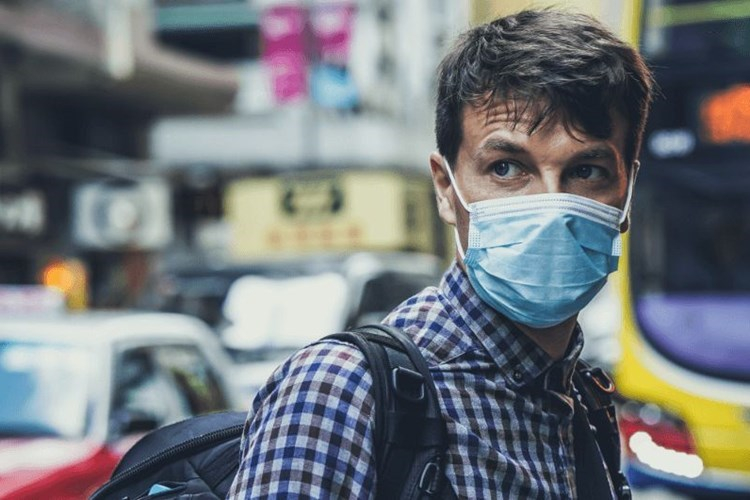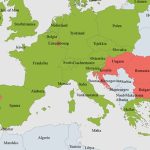
August 20, 2020 – The second official COVID-19 Croatia weekly report has been released by the Koronavirus government website, covering August 11-17.
| Tested | Confirmed cases | Active cases | Recovered | Self-isolation | Hospitalized | On a respirator | Deaths |
| 138 647 (+990*) |
5649 (+85*) |
1236 | 5254 | 4516 | 126 | 11 (+0*) |
166 (+0*) |
A total of 59 people died in this epidemic wave. Most of the deceased had significant comorbidities or were of advanced age. The average age of the deceased in this epidemic wave is 77.8 years. Fourteen people died on a respirator.
*number in the last 24 hours
There are currently 22 testing places in the Republic of Croatia that perform RT-PCR analysis and collect samples. All processed samples enter national Croatian Health Insurance Institute platform, which is accessible to all county public health institutes. County public health institutes submit data about positive cases, sources of infection and hotspots as part of their daily reports to the Croatian Institute of Public Health. The Croatian Institute of Public Health collects information about hotspots, hospital treatment of COVID-19 positive persons, COVID-19 positive patients on respirators and the deceased.
Daily report
In the past 24 hours, 85 new cases of SARS-CoV-2 virus infection were recorded and the number of currently ill (active cases) in Croatia today is a total of 1,236. Among them, 126 patients are in hospital and 11 of them are on a respirator. The average age of new patients in the past 24 hours was 33.6 years. There’re no new deceased. Since February 25th 2020, when the first case of infection was recorded in Croatia, a total of 6,656 people infected with the new coronavirus have been recorded until today, of whom 166 have died and 5,254 have recovered. There are currently 4,516 people in self-isolation. Until today, a total of 138,647 people has been tested and 990 in the last 24 hours. The share of confirmed cases in the total number of persons tested is 4.77%. The average age of confirmed cases is 44.49 years, and 50.62% of confirmed cases are men and 49.38% women.
Important numbers
- the number of new confirmed cases per 100,000 inhabitants in the last 14 days: 33.32/100,000
- the number of new cases in intensive care per 100,000 inhabitants in the last 14 days: 0.3/100,000
- the number of tested persons in the last 24 hours, the overall share of confirmed cases in the last 14 days: 990, 8.2%.
Epidemiological situation in Croatia
Geographical distribution of new COVID-19 cases by counties
A total of 59 people died in this wave of epidemics. Most of the people had significant comorbidities or were of advanced age. The average age of the deceased in this wave of epidemics is 77.8 years. Nineteen people died on a respirator.Overview of the situation by counties
| COUNTY | Total number of cases in 14 days |
Number of patients in the period 11/8/2020- 17/8/2020 |
14-day rate of confirmed cases per 100,000 inhabitants |
7-day rate of confirmed cases per 100,000 inhabitants |
| CITY OF ZAGREB | 381 | 305 | 47.36 | 37.91 |
| BJELOVARSKO-BILOGORSKA | 5 | 3 | 4.63 | 2.78 |
| BRODSKO-POSAVSKA | 54 | 33 | 38.55 | 23.56 |
| DUBROVAČKO-NERETVANSKA | 28 | 20 | 23.10 | 16.50 |
| ISTARSKA | 20 | 15 | 9.58 | 7.19 |
| KARLOVAČKA | 29 | 22 | 24.82 | 18.83 |
| KOPRIVNIČKO-KRIŽEVAČKA | 3 | 2 | 2.79 | 1.86 |
| KRAPINSKO-ZAGORSKA | 10 | 9 | 7.98 | 7.18 |
| LIČKO-SENJSKA | 10 | 7 | 22.13 | 15.49 |
| MEĐIMURSKA | 11 | 11 | 10.01 | 10.01 |
| OSJEČKO-BARANJSKA | 89 | 58 | 32.10 | 20.92 |
| POŽEŠKO-SLAVONSKA | 14 | 11 | 20.63 | 16.21 |
| PRIMORSKO-GORANSKA | 36 | 26 | 12.67 | 9.15 |
| SISAČKO-MOSLAVAČKA | 13 | 11 | 8.75 | 7.40 |
| SPLITSKO-DALMATINSKA | 354 | 264 | 79.01 | 58.92 |
| ŠIBENSKO-KNINSKA | 62 | 61 | 61.91 | 60.91 |
| VARAŽDINSKA | 17 | 13 | 10.18 | 7.79 |
| VIROVITIČKO-PODRAVSKA | 5 | 4 | 6.64 | 5.32 |
| VUKOVARSKO-SRIJEMSKA | 105 | 39 | 68.02 | 25.26 |
| ZADARSKA | 59 | 46 | 35.09 | 27.36 |
| ZAGREBAČKA | 57 | 47 | 18.42 | 15.19 |
| REPUBLIC OF CROATIA | 1362 | 1007 | 33.32 | 24.63 |
Table 1. Total number of patients and number of patients in the last week by counties, total rate of confirmed cases per 100,000 inhabitants and rates of confirmed cases in the last 7 and last 14 days per 100,000 inhabitants
Epidemic by weeks, from 19 th – 25 th week of the epidemic
In the period from 29 th of June to 17 th of August 2020, the number of cases per week (from the 19 th to the 25 th week of the epidemic) was from 460 to 967 and the rate from 11.3 to 23.7 per 100,000 inhabitants. The number of tests performed per week was ranged from 7957 to 9525 and the share of positive tests in those tested per week ranged from 5.8 to 10.2%. During this period, the weekly number of cases and the percentage of positive tests in the weekly number of tested varied. An overview is given in Table 2.

Table 2. Overview of the number of confirmed cases by weeks, from week 19. – 25.
In the period from 29 th of June to 17 th of August 2020, the number of cases per week (from the 19 th to the 25 th week of the epidemic) was from 460 to 967. The number of deceased varied from 6-9 and showed increase in the number compared to 22 nd and 23 rd week of the epidemic. The number of deceased who were on a respirator at the time of death ranged from 1 to 5, with an increase in that number in the 22 nd week of the epidemic when there were 6 people on a respirator. The share of deceased on the respirator ranged in the weekly number of deaths from 16.7-55.6%. The mean age of deceased was approximately the same except in the 21 st week of the epidemic, when the mean age of death cases was 69 years.The death rate ranged from 0.1 in the 19 th week of the epidemic to 0.2 in the 25 th week of the epidemic with an increase in the 22 nd and 23 rd week of the epidemic when it was 0.4 and 0.3. An overview is given in Table 3.

Table 3. Overview of patients on respirator and deaths by weeks, from week 19. – 25.
Died from COVID-19, 29 th of June – 17 th of August 2020, age and sex
A total of 59 people died in this wave of epidemics. Most of the people who died had significant comorbidities or were of advanced age. The mean age of the deceased in this wave of epidemics is 77.8 years. Nineteen people died on a respirator. An overview of the situation is given in Figure 1.
Figure 1. Age and sex distribution of deaths from COVID-19 in the period 29 th June – 17 th August 2020

Table 4. Overview of the number of new cases, 7-day rate and deaths by weeks, from week 19. -25.
Hotspots
Cases of COVID-19 have been reported in all counties in the last week. In counties with a relatively small population (Ličko – senjska County and Požeško – slavonska County), even a small increase in the number of new cases can lead to a significant increase in the 7-day incidence.Continental Croatia
The largest number of new cases in continental Croatia is in the City of Zagreb, Osječko – baranjska County and Zagrebačka County. Nightclubs on the coast are still active hotspots and now is time to return from holidays and vacations and it is expected that the largest share of new cases will be associated directly with nightclubs. These are mostly young people who infect their contacts upon return, mostly family members. In addition to cases and their contacts related to holidays and going out to the nightclubs, there were also imported cases of people who were tested for symptoms and did not have a significant epidemiological history. The situation in Vukovarsko – srijemska County, in which was a large increase in the number of new cases because of the spreading of the infection at weddings in recent weeks, has been brought under control and the daily numbers of new patients in that county have decreased. Grouping of patients was recorded at a wedding in Zagrebačka County, where guests from Karlovačka County were also present. The hotspot was brought under control.Coastal Croatia
The highest number of new cases was recorded in the Splitsko – dalmatinska, Šibensko – kninska and Zadarska County. There is still a large number of recorded cases and their contacts related to nightclubs. In the Splitsko – dalmatinska County we recorded groupings of patients around small family gatherings and one wedding. Groupings around weddings were also recorded in the Šibensko – kninska County. In the northern part of the Adriatic (Istria and Primorsko – goranska County), the epidemiological situation is mostly calm and cases related to holidays and night outs in Dalmatia, or contacts of previously ill cases or imported cases have been reported.The described hotspots were brought under control, but the spreading of the virus at these sites contributed to an increase in the 14-day cumulative rate of confirmed COVID-19 cases. All the described hotspots did not disrupt the availability or functioning of the health system or any other economic sector, i.e. public service.
Tourists
The table shows the number of infected foreign nationals according to the place of infection. Data refers to the period 7 th of July 2020 – 17 th of August 2020 and was collected via EWRS system.

In addition to the above, ‘several’ cases from the territory of the Republic of Croatia were also reported in Italy.
Measures
Measures to maintain physical distance, maintain hand hygiene and disinfection are still in force. Also, it is mandatory to wear face masks or medical masks indoors for all health workers and professionals, employees who work in social care system, and the ones who work in hospitality facilities.Figure 2 shows the measures and dates of their implementation in comparison with the number of patients, recovered, deceased and active cases of COVID-19 in Croatia from 18 th of June to 17 th of August.

Figure 2. Dates of implementation of measures in comparison with the movement of the number of sick, recovered, deceased and active cases of COVID-19 in Croatia from 18 th of June to 17 th of August.
Decisions of the Headquarters
- June 24 – Decision about changing the Decision on the manner of organizing public transport during the declared epidemic of the COVID-19 disease (mandatory face mask/medical mask in public transport)
- June 26 – Decision about controlling compliance with the Recommendation for the prevention of infection with COVID-19 in the catering industry of nightclubs (control of the implementation of recommendations in nightclubs)
- June 30 – Decision about a temporary prohibition on crossing the border of the Republic of Croatia (prohibition on crossing for third-country nationals, with the exception of those with long-term residence in the EU and other listed exceptions)
- July 10 – Decision about the necessary measures for the organization of gatherings attended by more than a hundred participants during the declared epidemic of the COVID-19 disease
- July 10 – Decision about the necessary measure of mandatory use of face masks or medical masks for the duration of the declared epidemic of the COVID-19 disease
- July 14 – Decision about changing the Decision on the necessary measure of mandatory use of face masks or medical masks for the duration of the declared epidemic of the COVID-19 disease
- July 14 – Decision about changing the Decision on the temporary prohibition on crossing the border crossings of the Republic of Croatia
- July 31 – Decision about changing the Decision on the temporary prohibition on crossing the border crossings of the Republic of Croatia
- August 13 – Decision about the necessary measure of limiting the working hours of hospitality facilities from the category bars /night clubs
CIPH recommendations
- Changing and amendment of the guidelines for the prevention and suppression of the COVID-19 disease epidemic for social service providers in the social welfare system – ver. 8/2
- Priorities for testing for SARS-CoV-2 (Consolidated revised recommendations of priorities for testing for SARS-CoV-2, handling of contacts, ending of isolation and self-isolation)
- Recommendations for the production and recording of audio-visual and music content during the epidemic of COVID-19 – ver. 2 (in Croatian and English)
Recommendations and measures on global and EU level
Europe
On 10 th of August 2020, ECDC released an updated version of the risk assessment:ECDC has additional documents and information available:
https://www.ecdc.europa.eu/en
https://www.ecdc.europa.eu/en/covid-19-pandemicThe number of cases and the 7-day cumulative incidence of COVID-19 confirmed cases worldwide can be found on the ECDC dashboard:
https://qap.ecdc.europa.eu/public/extensions/COVID-19/COVID-19.html
Austria
Bundesministerium für Soziales, Gesundheit, Pflege und Konsumentenschutz:
https://www.sozialministerium.at/Informationen-zum-Coronavirus/Neuartiges-Coronavirus-(2019-nCov).html
Netherlands
Government of the Netherlands: https://www.government.nl/topics/coronavirus-covid-19
National Institute for Public Health and the Environment: https://www.rivm.nl/en/novel-coronavirus-covid-19
Germany
Rober Koch Institut: https://www.rki.de/DE/Home/homepage_node.html
Slovenia
(gov.si): https://www.gov.si/en/topics/coronavirus-disease-covid-19/
National Institute for Public Health – Slovenia: https://www.nijz.si/en
United Kingdom
gov.uk: https://www.gov.uk/coronavirus
NHS: https://www.nhs.uk/conditions/coronavirus-covid-19/
World
WHO provides comprehensive information and documents
WHO COVID-19-Dashboard: https://covid19.who.int/
https://www.who.int/emergencies/diseases/novel-coronavirus-2019
Coronavirus disease (COVID-19) Weekly Epidemiological Update and Weekly Operational Update and Weekly Surveillance Report:
https://www.who.int/emergencies/diseases/novel-coronavirus-2019/situation-reports
https://www.euro.who.int/en/health-topics/health-emergencies/coronavirus-covid-19/weekly-surveillance-report
Sources of information
https://www.hzjz.hr/
https://zdravlje.gov.hr/
Information about the global epidemiological situation
More about COVID-19 in other countries can be found and learned on the ECDC website: https://www.ecdc.europa.eu/en/geographical-distribution-2019-ncov-casesThe WHO Regional Office for Europe, the European Commission and the European Observatory on Health Systems and Health Policy have at their disposal the COVID-19 Health System Response Monitor (HSRM). There is information available about European countries and ways to respond to this epidemic. The focus is on health systems and public initiatives: https://www.covid19healthsystem.org/mainpage.aspx
For the latest travel info, bookmark our main travel info article, which is updated daily.
Read the Croatian Travel Update in your language – now available in 24 languages!
Join the Total Croatia Travel INFO Viber community.










